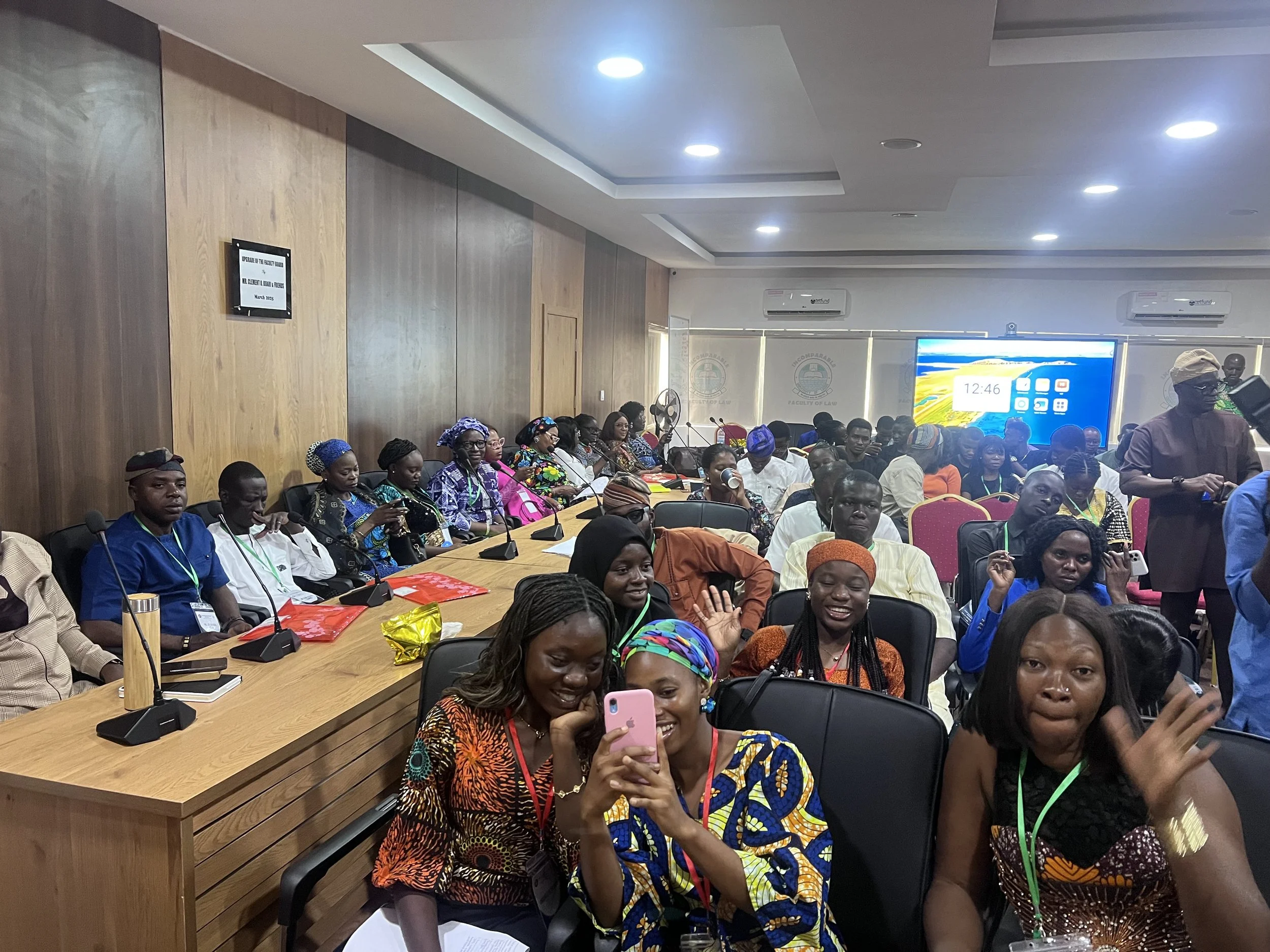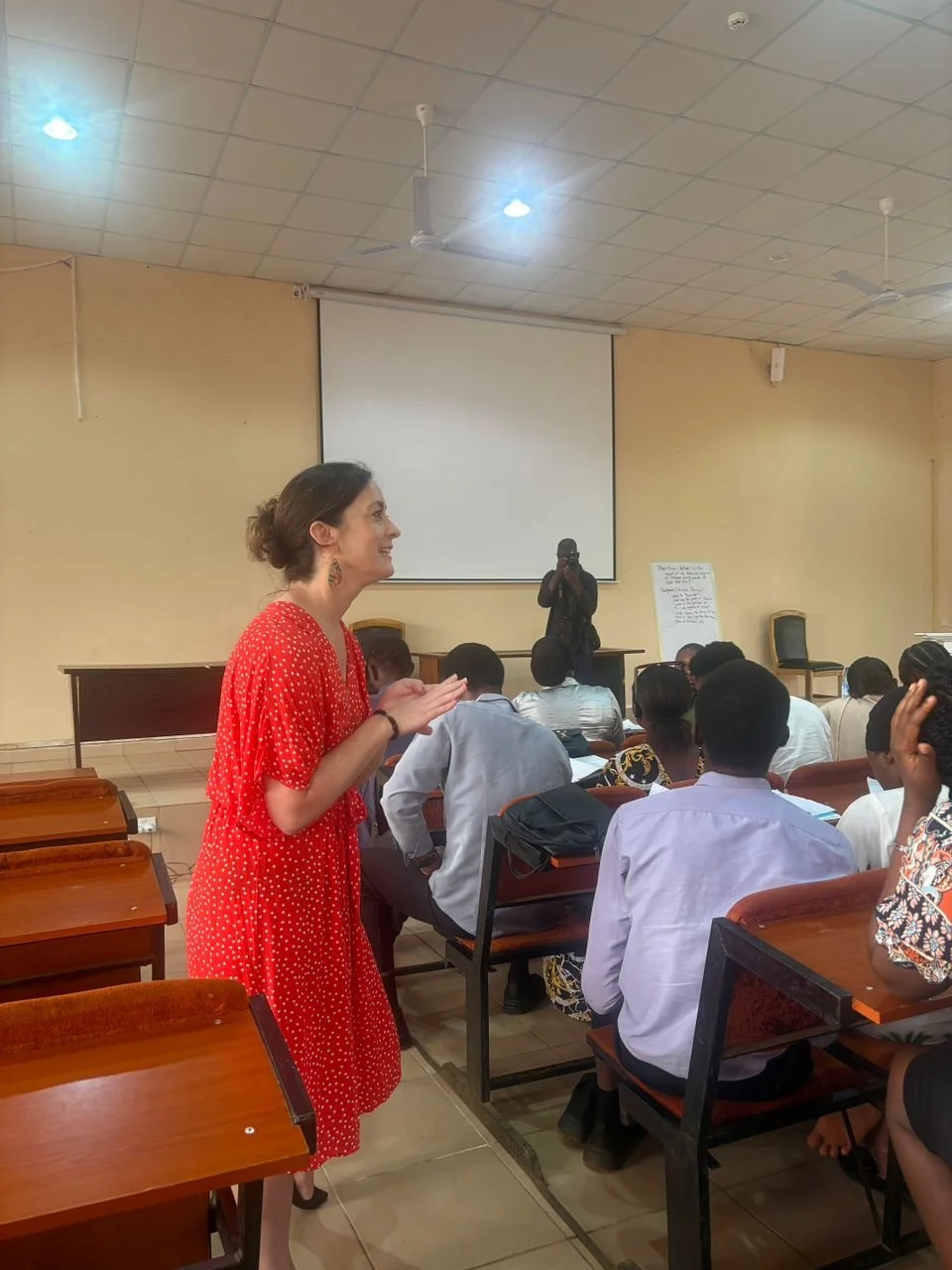What Nigeria Taught Me About Human Connection
by Dr. Brieanne Beaujolais
This summer, I traveled to Nigeria to teach in two, one-week immersive programs organized by Professors Without Borders (PROWIBO) in collaboration with University of Lagos and Ekiti State University. Based on my other international teaching experiences, when I signed on to teach in Nigeria, I expected the experience would be meaningful. I also expected it would be challenging. What I didn’t anticipate was how deeply transformational it would be—not just for the students, but for me.
Each program was a very brief five days. Despite this short time, ask anyone involved—students, local teachers, fellow international faculty—and you’ll hear the same thing: this PROWIBO program was transformational.
I felt evidence of transformation in the participants’ earnestness to take final photos, to hold our hands and to hug us goodbye. The students are still writing to us and posting daily about their experiences on social media.
During longer programs I’ve experienced this type of deeply meaningful educational exchange where the parting good-byes are emotionally difficult and the impact of it all stays deep in your bones long after the program ends. But this time, I did not understand how, in less than a week, we could all feel so transformed.
I also could not understand how, in such a short amount of time, I could feel so safe—physiologically, emotionally, relationally—even while navigating for the first time drastically different educational and cultural systems where, because of our security risks, part of our daily routine involved being escorted everywhere by armed guards. Seeing guns invokes fear, so why was I so calm and so present?
In the two weeks since the programs ended, I have had some time for reflection, and have come to believe that the cause of these unexpected outcomes—the deep transformation among participants and my uncharacteristic feeling of safety and calm—can be explained primarily by one thing: the biology of connection.
Polyvagal Theory: A Lens for Understanding Education
As I reflected on the emotional weight of these two weeks—on how changed we all felt after such a short time—I kept returning to something I learned earlier this summer when attending the Changemakers Conference in Marysville, OH. The conference was hosted by the Mental Health and Recovery Board of Union County for educators, behavioral health providers, human services practitioners, and others who work in settings with children and youth. I attended the conference because of my researcher/evaluator role here at Mighty Crow.
During the conference Dr. Lori DeSautel’s spoke about the application of social and relational neurosciences to education with a particular focus on the impact of trauma and adversity on social, emotional, and behavioral health. Much of her work is informed by Dr. Stephen Porges’ polyvagal theory which, in short, proposes that our nervous systems are wired to seek safety through social connection. When our nervous system detects threat—even in subtle ways—our prefrontal cortex goes offline obstructing our opportunity to learn. When we feel safe, heard, and valued, a neurobiological network called the social engagement system is activated enabling us to be open, curious, expressive, and creative.
“The social engagement system literally links the face to the heart.”
That’s what I believe happened during the PROWIBO programs: Our nervous systems, across cultures and backgrounds, learned to trust one another which created an open, affirming, and reciprocal learning space for students. A space where their ideas matter. Where their voice is central. Where learning is not a transaction but a relationship. Human connection is not just a possibility but a priority. It is not just about curricular content, but also about context—a relational field that allows transformation to occur.
From Anxious to Engaged: My Personal Transformation
Another unexpected part of my experience in Nigeria was how calm and connected I felt—despite unfamiliar surroundings, cultural differences, and even the constant presence of armed security. And, despite my many years of teaching, public speaking has always triggered anxiety for me, even though my teaching style is highly interactive, I still get nervous.
It is hard for me to understand how, in Nigeria—a place entirely foreign to me, with real security concerns, when I would have expected my nervous system to be even more dysregulated than usual—I so quickly felt at ease around students and fellow colleagues.
I think polyvagal theory and the social engagement system again provide a neurological explanation for this experience through the concept of relational safety—the sense of emotional and social safety in the presence of others. This biological state allows us to relax, connect, and fully engage with others when our nervous system detects we are safe. It’s not about whether a space is objectively safe; it’s about whether our nervous system perceives it as safe.
Our bodies are constantly scanning for cues of threat or trust—facial expressions, tone of voice, body language, and more. In Nigeria, I received countless subtle—but powerful—signals of safety: warm welcomes from our colleagues; enthusiastic interactions with students; soft, warm smiles from the security guards; excitement and shared laughter in the classrooms; curiosity and care from my Nigerian and international colleagues. These weren’t just pleasant moments; they were biological regulators that told my system, You’re safe here.
In an environment where I might have expected fear or hyper-vigilance, I found trust, attunement, and resonance. And that allowed my nervous system to downshift and make space for clarity, creativity, and even joy.
In the end, what the PROWIBO experience in Nigeria reinforced for me is this: We cannot separate learning from connection, and we can’t separate connection from safety.
So how does a five day program change a life? It doesn’t do it alone. But it can catalyze the change, because it activates something deep and evolutionary in all of us. We are social beings. We learn best when we feel safe, connected, and seen. And when that happens—in a classroom in Nigeria or anywhere else—the possibilities are profound.
I went to teach. I left transformed.



